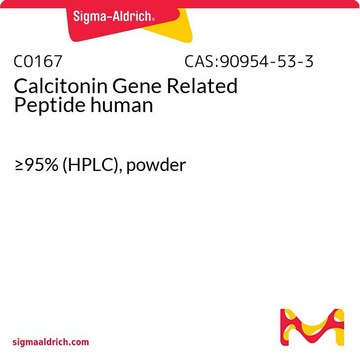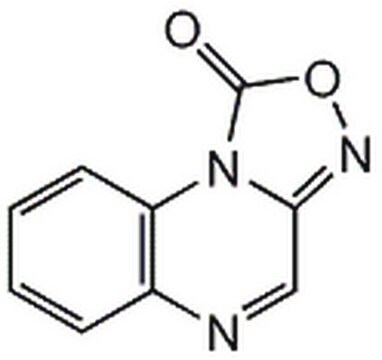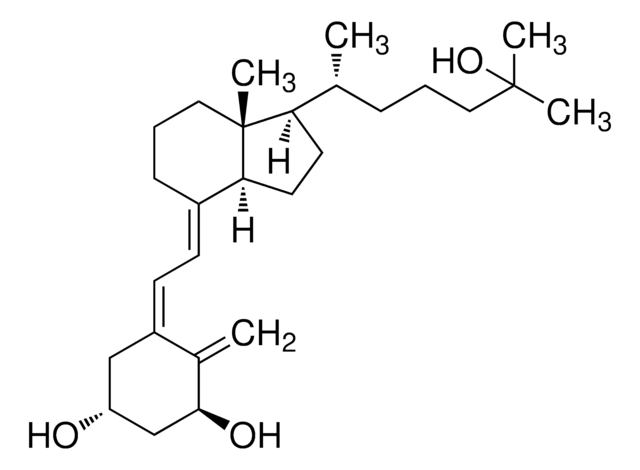C2806
Calcitonin Gene Related Peptide Fragment 8-37 human
≥97% (HPLC), powder
Synonyme(s) :
α-CGRP 8-37, FBHuman
About This Item
Produits recommandés
Niveau de qualité
Pureté
≥97% (HPLC)
Forme
powder
Composition
Peptide content, ~70%
Température de stockage
−20°C
Chaîne SMILES
CC(C)C[C@H](NC(=O)CNC(=O)[C@H](C)NC(=O)[C@H](CC(C)C)NC(=O)[C@H](CCCNC(N)=N)NC(=O)[C@H](Cc1c[nH]cn1)NC(=O)[C@@H](NC(=O)[C@@H](N)C(C)C)[C@@H](C)O)C(=O)N[C@@H](CC(C)C)C(=O)N[C@@H](CO)C(=O)N[C@@H](CCCNC(N)=N)C(=O)N[C@@H](CO)C(=O)NCC(=O)NCC(=O)N[C@@H](C(C)C)C(=O)N[C@@H](C(C)C)C(=O)N[C@@H](CCCCN)C(=O)N[C@@H](CC(N)=O)C(=O)N[C@@H](CC(N)=O)C(=O)N[C@@H](Cc2ccccc2)C(=O)N[C@@H](C(C)C)C(=O)N3CCC[C@H]3C(=O)N[C@@H]([C@@H](C)O)C(=O)N[C@@H](CC(N)=O)C(=O)N[C@@H](C(C)C)C(=O)NCC(=O)N[C@@H](CO)C(=O)N[C@@H](CCCCN)C(=O)N[C@@H](C)C(=O)N[C@@H](Cc4ccccc4)C(N)=O
InChI
1S/C139H230N44O38/c1-66(2)48-86(161-102(193)60-155-113(197)74(17)159-120(204)87(49-67(3)4)168-118(202)83(40-31-45-152-138(147)148)163-123(207)90(53-80-57-151-65-158-80)173-136(220)111(77(20)188)182-131(215)105(145)69(7)8)121(205)169-88(50-68(5)6)122(206)176-96(64-186)129(213)165-84(41-32-46-153-139(149)150)119(203)175-94(62-184)115(199)156-58-101(192)154-59-104(195)177-107(71(11)12)134(218)179-108(72(13)14)133(217)166-82(39-28-30-44-141)117(201)171-91(54-98(142)189)125(209)172-92(55-99(143)190)124(208)170-89(52-79-36-25-22-26-37-79)126(210)180-109(73(15)16)137(221)183-47-33-42-97(183)130(214)181-110(76(19)187)135(219)174-93(56-100(144)191)127(211)178-106(70(9)10)132(216)157-61-103(194)162-95(63-185)128(212)164-81(38-27-29-43-140)116(200)160-75(18)114(198)167-85(112(146)196)51-78-34-23-21-24-35-78/h21-26,34-37,57,65-77,81-97,105-111,184-188H,27-33,38-56,58-64,140-141,145H2,1-20H3,(H2,142,189)(H2,143,190)(H2,144,191)(H2,146,196)(H,151,158)(H,154,192)(H,155,197)(H,156,199)(H,157,216)(H,159,204)(H,160,200)(H,161,193)(H,162,194)(H,163,207)(H,164,212)(H,165,213)(H,166,217)(H,167,198)(H,168,202)(H,169,205)(H,170,208)(H,171,201)(H,172,209)(H,173,220)(H,174,219)(H,175,203)(H,176,206)(H,177,195)(H,178,211)(H,179,218)(H,180,210)(H,181,214)(H,182,215)(H4,147,148,152)(H4,149,150,153)/t74-,75-,76+,77+,81-,82-,83-,84-,85-,86-,87-,88-,89-,90-,91-,92-,93-,94-,95-,96-,97-,105-,106-,107-,108-,109-,110-,111-/m0/s1
Clé InChI
NDACAFBDTQIYCQ-YVQXRMNASA-N
Informations sur le gène
human ... CALCA(796)
Vous recherchez des produits similaires ? Visite Guide de comparaison des produits
Amino Acid Sequence
Description générale
Application
Actions biochimiques/physiologiques
Calcitonin gene-related peptide (CALCA) serves as a proangiogenic growth factor in the development of human placenta. Mutations of CALCA gene is associated with Parkinson′s disease, ovarian cancer and essential hypertension. CALCA induce vascular endothelial cell proliferation, migration and capillary-like tube formation.
Autres remarques
Code de la classe de stockage
11 - Combustible Solids
Classe de danger pour l'eau (WGK)
WGK 3
Point d'éclair (°F)
Not applicable
Point d'éclair (°C)
Not applicable
Équipement de protection individuelle
Eyeshields, Gloves, type N95 (US)
Certificats d'analyse (COA)
Recherchez un Certificats d'analyse (COA) en saisissant le numéro de lot du produit. Les numéros de lot figurent sur l'étiquette du produit après les mots "Lot" ou "Batch".
Déjà en possession de ce produit ?
Retrouvez la documentation relative aux produits que vous avez récemment achetés dans la Bibliothèque de documents.
Les clients ont également consulté
Notre équipe de scientifiques dispose d'une expérience dans tous les secteurs de la recherche, notamment en sciences de la vie, science des matériaux, synthèse chimique, chromatographie, analyse et dans de nombreux autres domaines..
Contacter notre Service technique















